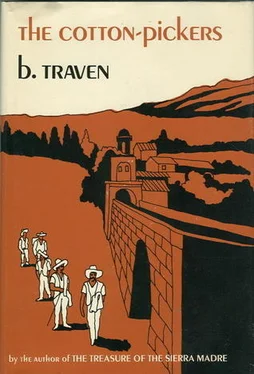B. Traven - The Cotton-Pickers
Здесь есть возможность читать онлайн «B. Traven - The Cotton-Pickers» весь текст электронной книги совершенно бесплатно (целиком полную версию без сокращений). В некоторых случаях можно слушать аудио, скачать через торрент в формате fb2 и присутствует краткое содержание. Год выпуска: 1969, Издательство: Hill and Wang, Жанр: Проза, на английском языке. Описание произведения, (предисловие) а так же отзывы посетителей доступны на портале библиотеки ЛибКат.
- Название:The Cotton-Pickers
- Автор:
- Издательство:Hill and Wang
- Жанр:
- Год:1969
- ISBN:нет данных
- Рейтинг книги:3 / 5. Голосов: 1
-
Избранное:Добавить в избранное
- Отзывы:
-
Ваша оценка:
- 60
- 1
- 2
- 3
- 4
- 5
The Cotton-Pickers: краткое содержание, описание и аннотация
Предлагаем к чтению аннотацию, описание, краткое содержание или предисловие (зависит от того, что написал сам автор книги «The Cotton-Pickers»). Если вы не нашли необходимую информацию о книге — напишите в комментариях, мы постараемся отыскать её.
—Book World
The Cotton-Pickers — читать онлайн бесплатно полную книгу (весь текст) целиком
Ниже представлен текст книги, разбитый по страницам. Система сохранения места последней прочитанной страницы, позволяет с удобством читать онлайн бесплатно книгу «The Cotton-Pickers», без необходимости каждый раз заново искать на чём Вы остановились. Поставьте закладку, и сможете в любой момент перейти на страницу, на которой закончили чтение.
Интервал:
Закладка:
The girls who were at the top of their profession spoke not only French, but also English, German, and Italian, in addition to Spanish; for certain forms of entertainment are more pleasurable when accompanied by the music of the mother tongue, and certain sensations come to full flowering when aroused by words that strike chords and memories which a strange language never can touch. Such words bring back the memory of the first feeling of shame, thoughts of the first girl you desired, and sensations of those mysterious hours which ushered in the first feeling of maturity.
Therefore most of the poor girls with only Spanish at their command didn’t get on well, and were soon taking in the one-peso trade — native workers, poor devils, who couldn’t afford to lay out much cash on recreation of this kind. These girls lived in remote parts of the quarter, where the rooms, or cribs, were the cheapest and most crudely furnished and where street musicians strayed only occasionally, that is, when the competition was too strong elsewhere. In this area, the girls dressed so simply that they could go to town without attracting attention. Their earnings at times were barely sufficient to buy rouge and powder, yet they had to have water, soap, antiseptic solution, and clean towels for every visitor. At any time an Inspector of the Sanitary Commission might enter the room, demand a look at the girl’s health certificate, and inspect the room for cleanliness. The girls’ personal effects were their own affairs, but the other standard items had to conform with health regulations, or else there would be quarantine, which was a costly business, more to be dreaded than a fine or a jail sentence.
Yet, there was no slavery. Every girl was a free agent. She could leave the house and the quarter at any moment she chose. There was no old madame who could detain her under some pretext of a rent pledge, unearned board, or a laundry bill. Rent had to be paid one week in advance, and that was that; if she couldn’t pay in advance she had to leave the quarter. Any girl caught soliciting in the streets was put into jail.
In the so-called Golden Section at the entrance to the quarter, flooded by the brilliant lights of the dance halls, lived the French girls. They spoke a torrentially rapid French, and all of them swore that they were Parisiennes; most of them, of course, never had set eyes on Paris, but came from London, Berlin, Naples, Budapest, Warsaw, Leningrad, and places even farther from the French capital. None of them had official passports, for ladies devoting themselves to this most ancient profession are not permitted to immigrate; but they got in, somehow, each one by a different trick.
The Parisiennes were the most elegant girls in the quarter; they had to be, to keep going in the Golden Section. The moment their earnings ceased to afford the necessary trappings, a thing that could happen quickly and did happen often, the girls had to move to the next cheaper section. And so it would come to pass with many a girl who didn’t sufficiently understand the business, and failed to learn the tricks which might have made her the mistress of her trade, that she had to move farther and farther away from the Golden Section until she ended up in the cribs in the lowliest area of all.
The girls in the Golden Section were visited by men to whom dollars and pesos were as nothing, such as the oilmen who had lived in the bush for six or eight months where they couldn’t spend money, and who came with thousands of dollars burning holes in their pockets. Perhaps they would start out intending to spend no more than twenty, yet might end up next morning begging a peso to get back to the hotel by second-class bus. Then there were those American tourists who came to the country for no other pleasure but just this one, and of course overpaid for every service. There were also the speculators who sold shares of oil stock, gold or silver mines to greenhorns, shares in phantom wells in areas where no oil would be found unless the poor investor carried a can of it to the place. These men, loaded with cash so easily acquired, went from house to house and girl to girl with inexhaustible vitality. Mind you, they went to the mistresses of the art, those highly experienced females who could have made a lively fountain spurt from the driest tree trunk.
The houses of the quarter were mainly of wood and they all looked alike, lined up side by side like Baltimore row houses. They were with few exceptions one-room affairs; the room had only one door which opened directly onto the street, and each room had one barred window which was unglazed but in some cases covered with mosquito netting. The one door was both for security and non-secretive access; there was no alley-entrance business and no slipping out the back way.
Thus, the girls sat in plain view at their open doors, or they stood about, alone or in small groups, chattering and laughing; if they had troubles, they kept them to themselves.
Many of the girls made a practice of sitting at their doors crocheting fine lace or embroidering dainty handkerchiefs. It was a maneuver that never failed. It reminded men who were perhaps having to spend long stretches of time in a foreign country or who had been at sea, in the jungle, the oil field, or the bush for weeks or months on end of the cozy domesticity of their homes.
A man couldn’t pass a door without being greeted by a girl, who invited him with the sweetest of words and gestures to step in and have a good time. Often the invitation was accompanied by such daring promises that the most iron resistance and most holy vow might be overthrown on the spot. Once you had passed by her door, however, the girl would immediately desist, for you would be on her neighbor’s territory where only she had a right to make inviting promises.
There was only one way to pass by these girls easily: “No money,” and you were free to pass, assuming that the girl believed you. In most cases she didn’t, but would playfully proceed to reach into your pockets, never actually lifting as much as a quinto.
The señoritas demonstrated their diplomacy in refraining from coaxing the local, respectable citizens who had to pass through the quarter on their way home. Most of them chose their clients according to their own tastes and by no means accosted every man who passed their door. A man might pause at a door, intent on getting on with a particular girl, but no amount of money or high bidding could win her over if for some reason the gentleman was not to her liking. Some señoritas refused to welcome a Chinese, others a Negro, and some wouldn’t accept an Indian. Yet, as in all businesses, if trade was bad the girls might bring themselves to smile at someone whom three days previously they would have indignantly turned away.
The señoritas gave full value for the money. Yet these mistresses lacked what has been called the love of the adored woman. Time is money, and at the quarter you would search in vain for sweet trifling, for tender playfulness, for hours of desire and groping toward fulfillment. They had high art, yes; what you didn’t get from them was the sweet longing for the lover.
Thus, the girls merely confirmed the priceless value of the loved and loving woman. They knew this, too, and made no attempt to deny it; they sold only and precisely what the gentlemen bargained for. They were artists and good businesswomen; they knew how to attract their clientele and how to keep the business going.
17
“Oh, now, there you are, Antonio,” I greeted him. “I’ve been looking for you all around the quarter. I thought you must have gone home.”
“No, I wasn’t thinking of going home yet, Gales. Let’s go to the Salon Pacifico and try our luck.”
The Pacifico had a broad main room decorated in gold. Along one side were a number of recesses, each with a table surrounded on three sides by a comfortably padded bench; the back wall had a similar settee along its entire length. Opposite the recesses was a bar with high stools, and on a platform in the corner was the dance band. The walls were decorated with life-size paintings of nude women. These handsome women needed no fig leaves to remind you that they had something to hide. In this country it would be laughable to try to persuade men and women or even children that the human body sprouted fig leaves.
Читать дальшеИнтервал:
Закладка:
Похожие книги на «The Cotton-Pickers»
Представляем Вашему вниманию похожие книги на «The Cotton-Pickers» списком для выбора. Мы отобрали схожую по названию и смыслу литературу в надежде предоставить читателям больше вариантов отыскать новые, интересные, ещё непрочитанные произведения.
Обсуждение, отзывы о книге «The Cotton-Pickers» и просто собственные мнения читателей. Оставьте ваши комментарии, напишите, что Вы думаете о произведении, его смысле или главных героях. Укажите что конкретно понравилось, а что нет, и почему Вы так считаете.











